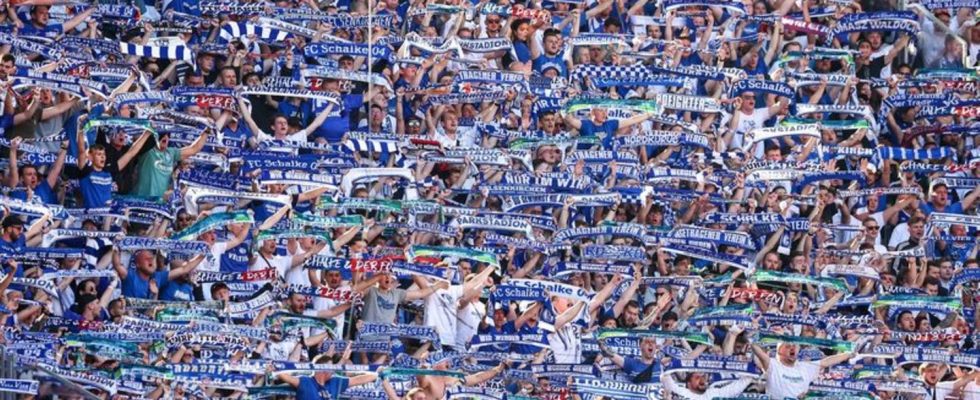Before the start of the season
Stars, full stadiums, tradition: 2nd league has long been a 1b league
The fans of FC Schalke 04 will be cheering on their team again in the 2nd division from Friday. photo
© Jan Woitas/dpa
The saying about the “strongest 2nd division of all time” is now a running gag. But it has probably never been as strong, or at least as appealing, as it has been in this 50th season.
Second class – because of: The 2. Before the start of its 50th season on Friday, the Bundesliga has long been a 1b league. At least.
Especially in the area of tradition and cult factor, the lower house with 13 former champions, ever better filled arenas and new stars like Max Kruse or Lars Stindl is on the right track to seriously compete with the Bundesliga.
In the second division, “more clubs are now playing that emotionalize people than one floor up,” said ex-professional Torsten Mattuschka, who analyzes the second division games for Sky every week, the “kicker”. And President Oke Göttlich from FC St. Pauli said: “It’s going to be an incredibly great second division. I can imagine that some in the Bundesliga would like it to be equipped like the second division.”
Premier League relevance is dwindling
So is the 2nd division the better Bundesliga? It’s definitely not that far yet. But while the relevance of the first division conference on Saturday is increasingly dwindling, the little sister can suddenly come up with duels like the opening cracker between the former European Cup winners Hamburger SV and FC Schalke 04 on Friday (8:30 p.m. / Sat.1 and Sky).
In any case, the 2nd division’s race to catch up with viewer interest should not only continue, but accelerate. Last year, the upper house had an average of 42,992 visitors, the 2nd division 22,263. “There will definitely be a record attendance this season,” said Klaus Allofs, sports director at Fortuna Düsseldorf.
Not only Fortuna will have their part in this, which will let spectators into their 54,000-seat arena free of charge for three games. The capacity of the 18 stadiums is only 6,000 apart in the league comparison, at 34,600 to 40,600. The Bundesliga climbers Heidenheim and Darmstadt had an average of 13,395 visitors last year. The relegated Schalke and Hertha BSC came in third and fourth in the first division spectator table to 57,392.
big names
In addition, there are now players with charisma such as Kruse, who switched to SC Paderborn, Lars Stindl, who has returned to Karlsruher SC, or nine-time international Marcel Halstenberg, who moved back to Hannover 96 for personal reasons. “These names are incredibly good for this league,” said long-time Bundesliga coach Dieter Hecking, who is now the sports director at 1. FC Nürnberg: “They enhance them, they are attractions, and they attract even more interested parties.” Under normal circumstances, such transfers as a second division club “can’t really be done,” said Allofs: “These are lucky circumstances for these clubs. Now you have to see how they deal with it.”
Paderborn, Karlsruhe and Hanover also belong to the extended circle of favorites with these leading players at the latest. When asked about the top favourite, Allofs, who also “would like to be promoted” with last year’s fourth in Düsseldorf, only wanted to answer multiple requests. “If you really want to name one, it’s Schalke,” said the ex-national player. And added with a laugh: “They can live with it.”
Promotion is not a sure-fire success for favorite teams
With up to ten potential contenders, some may even find themselves in a relegation battle over the course of the season. The fall of Arminia Bielefeld from the first to the third division in the previous year once again illustrated this danger. The promotion for the alpha animals Schalke, Hamburg and Hertha will therefore not be a sure-fire success. “I don’t think the big three will work it out among themselves,” said veteran coach Ewald Lienen.
Nevertheless, this trio wants and needs to go up. “Anyone who knows me knows that I want to get promoted,” said Schalke coach Thomas Reis: “And I can deal with pressure.” In Hamburg, sports director Jonas Boldt emphasized after five failed attempts: “We were always close – now we’re trying to finally go through the door.” At Hertha, coach Pal Dardai has at least noticed a change in mentality. “Last season it was 70 percent lazy players and 30 percent willing players,” he said. “And now it’s the other way around.”

